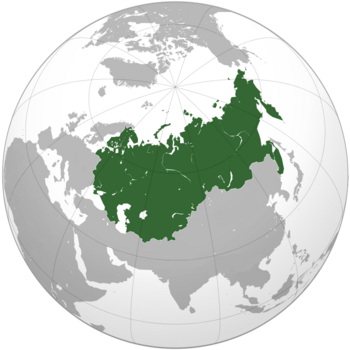Yangaea: Difference between revisions
old>Yangaea No edit summary |
m (1 revision imported) |
(No difference)
| |
Revision as of 18:51, 12 March 2019
The Community of Yangaea | |
|---|---|
| Motto: "The World's Nation." | |
 | |
| Capital | Xate |
| Official languages | English Maori creole |
| Ethnic groups |
|
| Demonym(s) | Yangaean |
| Government | Socialist Anarchy, Oligarchy |
| Legislature | National People's Congress |
| Formation | |
• Crowning of Rurik | 862 |
• Establishment of Pav' | 880 |
• 1300 | Duchy of Chekhov |
• 1547 | Tsardom of Pavlovsk |
• People's Federated Republic of Pavlovsk | 19 October 1917 |
| Population | |
• Estimate | 3,550,000 (76th) |
| Currency | Ruble (RUB) |
| Time zone | UTC +2 to +12 |
| Driving side | right |
| Calling code | +669 |
Yangaea, officially the 'The Community of Yangaea', is a small island country off of the coast of Perth. The nation identifies itself as a socialist anarchy, but generally operates as an oligarchy, with the power being shared by two elected leaders.
History
Ancient native history (pre-1840)
The islands were originally inhabited by a population called the Maori, who likely arrived from other nearby islands. The island was undiscovered by the developed world until its discovery by Brittanian explorers in the late 1600s. The native population at the time of discovery was around 250,000, almost all of which lived as a part of one tribe in southern Yangaea. The tribe depended on fishing and hunting the local iguanas for sustenance.
Colonization and Collapse (1840-1872)
After the British colonized Perth, they looked to also take what they called "New Perth", or modern day Yangaea. They sent in around 2,000 men in June of 1840 to build a city and "civilize" the natives. 6 months later, a British general came to check on the colony. The white men had completely accepted the native culture, and abandoned Christianity for the native folk religion. In addition, around 75% of the native women had been impregnated by the European settlers. Not long after the settlers and natives had completely assimilated into one single society. When a British ship returned in early 1872 to check in on the colony's progress, the ship was captured and converted into a
Geography
Climate
Environment
Politics and government
Military
Foreign relations
Economy
Energy
Industry
Infrastructure
Transport
Demographics
Education
Religion
Culture
Music and art
Cuisine
Sports
This article is from APSIA 1.2. For the most recent iteration of APSIA, look at Category:APSIA 2.B |
